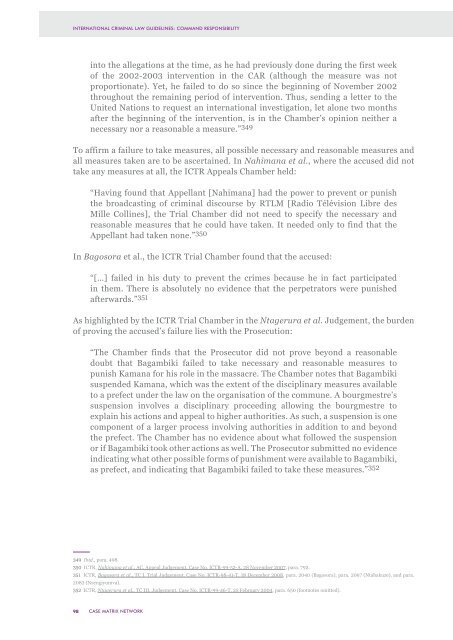Command Responsibility
CMN_ICL_Guidelines_Command_Responsibility_En
CMN_ICL_Guidelines_Command_Responsibility_En
Create successful ePaper yourself
Turn your PDF publications into a flip-book with our unique Google optimized e-Paper software.
INTERNATIONAL CRIMINAL LAW GUIDELINES: COMMAND RESPONSIBILITY<br />
into the allegations at the time, as he had previously done during the first week<br />
of the 2002-2003 intervention in the CAR (although the measure was not<br />
proportionate). Yet, he failed to do so since the beginning of November 2002<br />
throughout the remaining period of intervention. Thus, sending a letter to the<br />
United Nations to request an international investigation, let alone two months<br />
after the beginning of the intervention, is in the Chamber’s opinion neither a<br />
necessary nor a reasonable a measure.” 349<br />
To affirm a failure to take measures, all possible necessary and reasonable measures and<br />
all measures taken are to be ascertained. In Nahimana et al., where the accused did not<br />
take any measures at all, the ICTR Appeals Chamber held:<br />
“Having found that Appellant [Nahimana] had the power to prevent or punish<br />
the broadcasting of criminal discourse by RTLM [Radio Télévision Libre des<br />
Mille Collines], the Trial Chamber did not need to specify the necessary and<br />
reasonable measures that he could have taken. It needed only to find that the<br />
Appellant had taken none.” 350<br />
In Bagosora et al., the ICTR Trial Chamber found that the accused:<br />
“[…] failed in his duty to prevent the crimes because he in fact participated<br />
in them. There is absolutely no evidence that the perpetrators were punished<br />
afterwards.” 351<br />
As highlighted by the ICTR Trial Chamber in the Ntagerura et al. Judgement, the burden<br />
of proving the accused’s failure lies with the Prosecution:<br />
“The Chamber finds that the Prosecutor did not prove beyond a reasonable<br />
doubt that Bagambiki failed to take necessary and reasonable measures to<br />
punish Kamana for his role in the massacre. The Chamber notes that Bagambiki<br />
suspended Kamana, which was the extent of the disciplinary measures available<br />
to a prefect under the law on the organisation of the commune. A bourgmestre’s<br />
suspension involves a disciplinary proceeding allowing the bourgmestre to<br />
explain his actions and appeal to higher authorities. As such, a suspension is one<br />
component of a larger process involving authorities in addition to and beyond<br />
the prefect. The Chamber has no evidence about what followed the suspension<br />
or if Bagambiki took other actions as well. The Prosecutor submitted no evidence<br />
indicating what other possible forms of punishment were available to Bagambiki,<br />
as prefect, and indicating that Bagambiki failed to take these measures.” 352<br />
349 Ibid., para. 498.<br />
350 ICTR, Nahimana et al., AC, Appeal Judgement, Case No. ICTR-99-52-A, 28 November 2007, para. 792.<br />
351 ICTR, Bagosora et al., TC I, Trial Judgement, Case No. ICTR-98-41-T, 18 December 2008, para. 2040 (Bagosora), para. 2067 (Ntabakuze), and para.<br />
2083 (Nsengiyumva).<br />
352 ICTR, Ntagerura et al., TC III, Judgement, Case No. ICTR-99-46-T, 25 February 2004, para. 650 (footnotes omitted).<br />
98<br />
CASE MATRIX NETWORK


